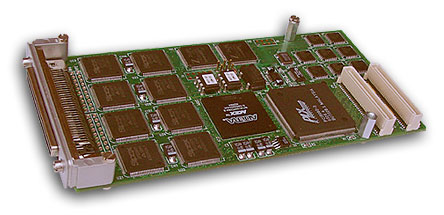|
PMC: The PCI Mezzanine Card |
| A PMC card is a peripheral card that gives a user the capability to add PCI functionality to a system.
A PMC card can be used in a cPCI system. Also, a PMC card can be used in a VME System. |

|
Data Acquisition |
|
General Standards Corporation is a leading supplier in data acquisition I/O boards, provides a complete family of
data acquisition cards for sonar, industrial, and embedded applications on several form factors/busses, and for many operating systems.
Functions available include analog I/O, serial I/O, and high speed parallel I/O.
|
Form Factors: | |
FREE DRIVERS
AND
LOANER BOARDS |
|
|
|
Software Drivers: |
- Windows
|
- VxWorks
|
- QNX
|
- Linux
|
- MathWorks
|
- Solaris
|
- Labview
|
- xPC Target
|
- Ask About Other Drivers
|
|


- Up to 64 Input Channels per Board
- Programmable Sampling Rates to 50M SPS
- GPS Synchronization
- Auto-Calibration
- Multi-Board Synchronization
- Sigma-Delta and Delta-Sigma Analog I/O
- Resolutions from 12 bits to 24 bits
Analog I/O Selection Tables
- Serial Mode Protocols include Asynchronous, Bisync, SDLC, HDLC, IEEE 802.3, Synchronous Telemetry, Simple Clock/Data ("-SYNC" product line), and Di-phase.
- Transceiver support RS485, RS422, RS232, RS423, V.35, RS530, as well as other software selectable mixed protocol modes
- Up to Eight Independent Serial Channels per Board
- Synchronous Serial Data Rates up to 10 Mbits/sec
- Asynchronous Serial Data Rates up to 1 Mbits/sec
- Deep Transmit and Receive FIFOs up to 128K
- PMC and cPCI rear I/O support
- Custom Protocols Available
Serial I/O Selection Tables
- Cable Transfer speeds up to 400 mb/per second
- Large FPGA provides for flexable cable interface
- Several cable transceiver options including RS-422, RS-485, LVDS, PECL, and TTL
Digital I/O Selection Table
|
A standard mezzanine card design, PMC is based on the Peripheral Component Interconnect (PCI) standard bus, which has been universally adopted for use as a high-performance
local bus in Pentium-based personal computers. With its further adoption as a mezzanine expansion bus for VMEbus, VME board makers are able to leverage off the economies of scale accruing to the
personal computer industry. This development also opens the floodgate of compatibility with other types of computers such as workstations, industrial and commercial computers. This standard
mezzanine bus has penetrated market areas which had previously remained proprietary, closely guarded or with high barriers to entry.
Mezzanine cards can satisfy three basic system design requirements:
- Provide a degree of flexibility to a host board such that a single host can be used in a variety of applications;
- Make it possible to stuff more components into a boards limited space;
- Add functions or enhancements to a board to extend product life.
As an IEEE standard, PMC assures users that any host or module complying with the standard will function in any module or host that has been designed to the specifications.
While this gives users the flexibility to mix-and-match different host cards with different option modules, it also gives vendors the ability to design basic host boards
without special consideration to interface I/O. The fact that PMC is an open standard allows OEMs with nonstandard buses to take advantage of the same leverage as
makers of standard buses.
The second advantage of using PMC is that it provides a large measure of stability. PMC provides a standard, high-performance local bus that will remain the same from
processor to processor. Only the processor-to-memory bus need be modified.
Performance, of course, is another key element of PMC. New graphics and GUIs, extensive use of imaging, video and faster
communications have placed a major demand on processor, I/O, and system bandwidth. PMC will go a long way to alleviate the I/O bottleneck. With a bandwidth of 132 Mbytes/sec for a 32-bit
implementation and 264 Mbytes/sec for a 64-bit version, PMC is capable of handling just about everything up through ATM and full-motion video.
PCI and PMC put the focus on the main objective of the standard-bus community trying to provide a standard, off-the-shelf alternative to costly proprietary design.
PMC will go a long way in providing that capability with a broad range of standard I/O.
Any PMC I/O board can be used on PCI Express, PCI-X, cPCI-X, PCI, cPCI, PC-104-Plus via an adapter. Our I/O
boards are being converted to PCI Express boards as opportunities arise, view our extensive line of I/O boards.
We have software drivers available for numerous operating systems including VxWorks, Linux, and Windows.
Click Here for more information on software driver availability.
|
|



